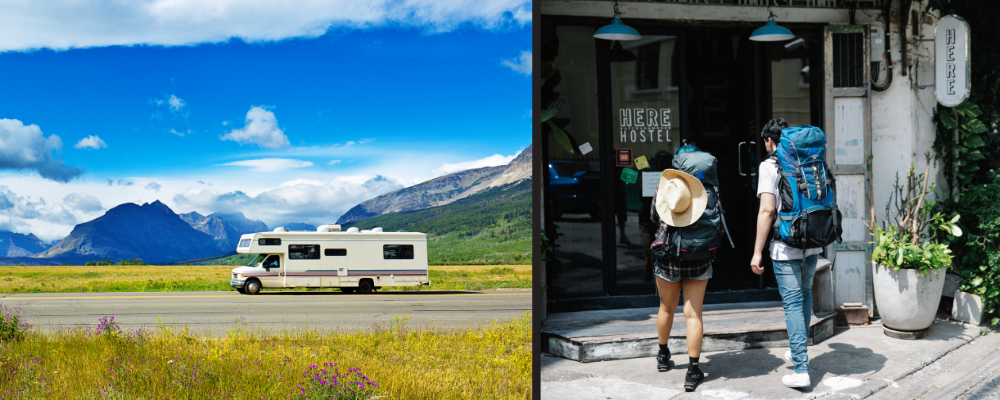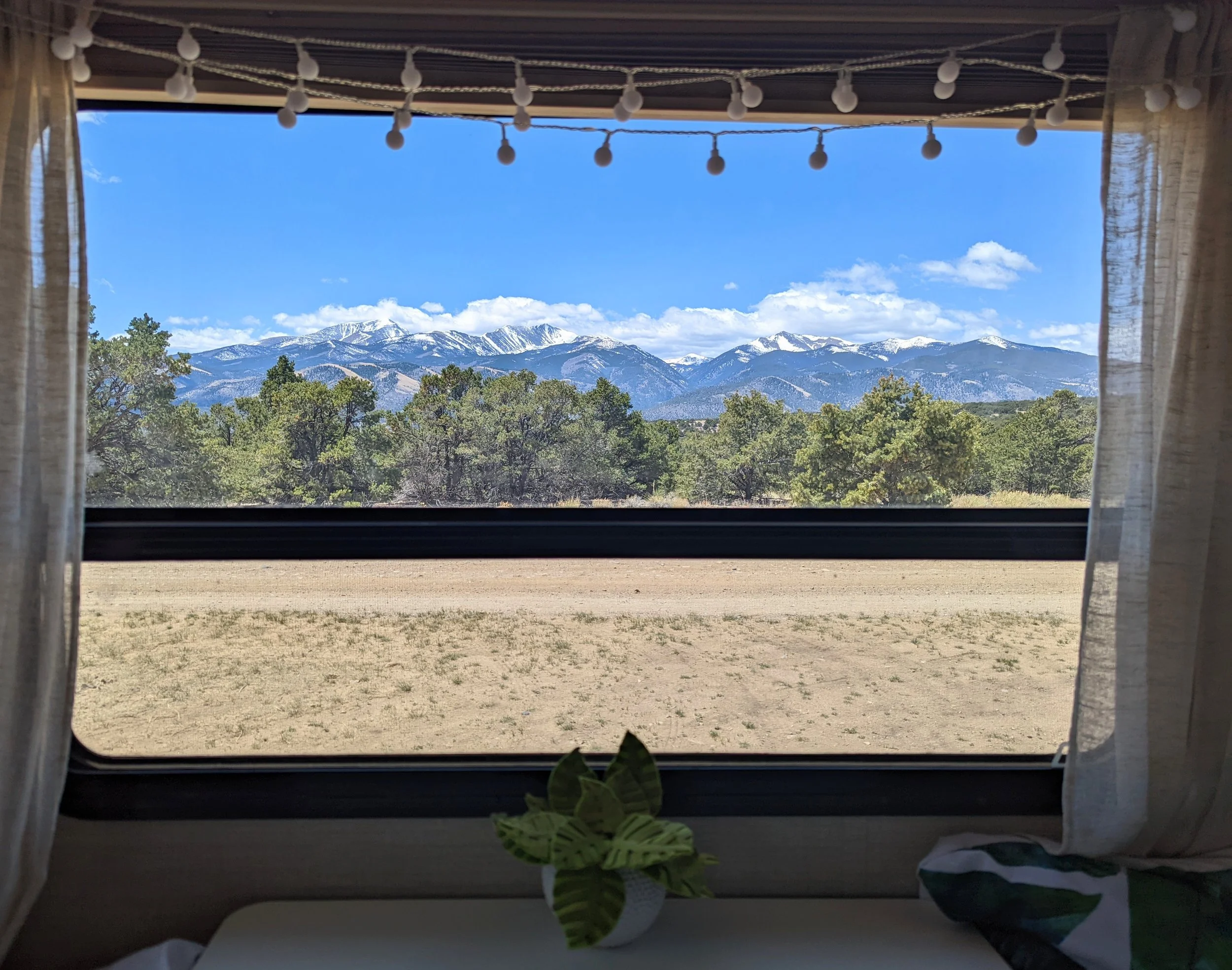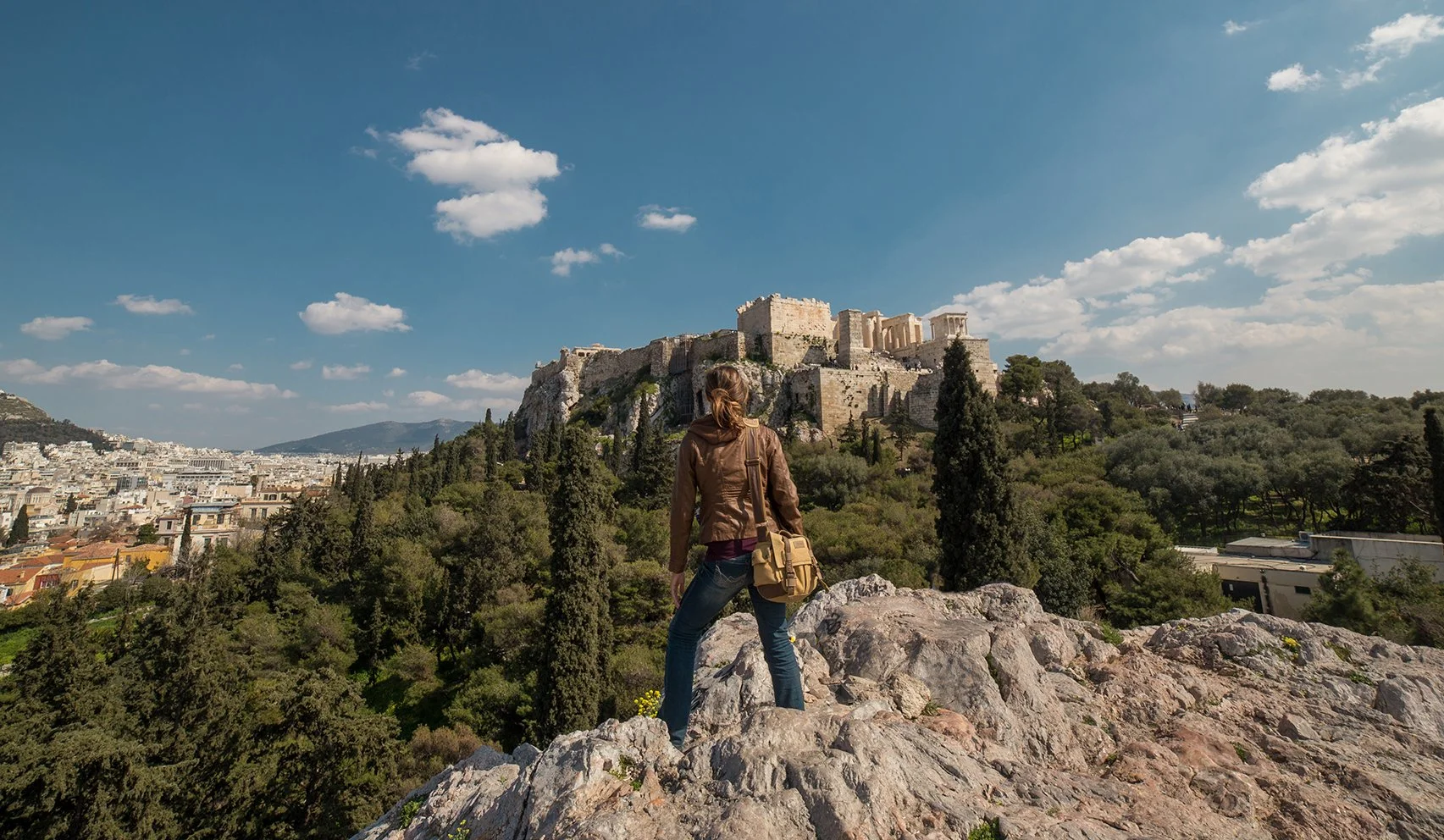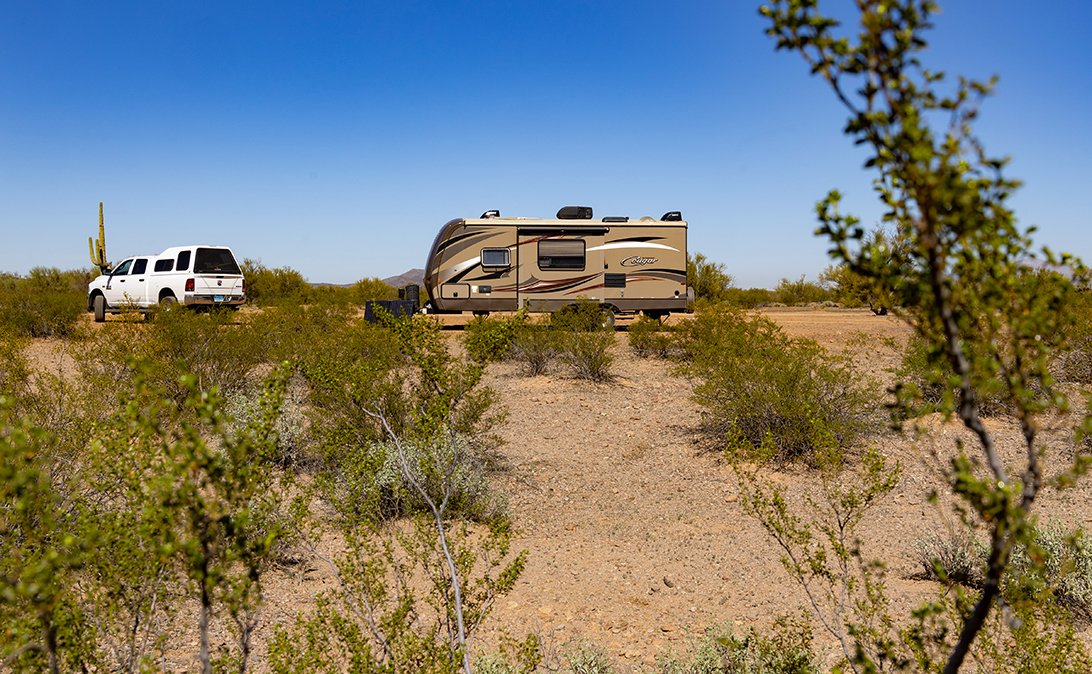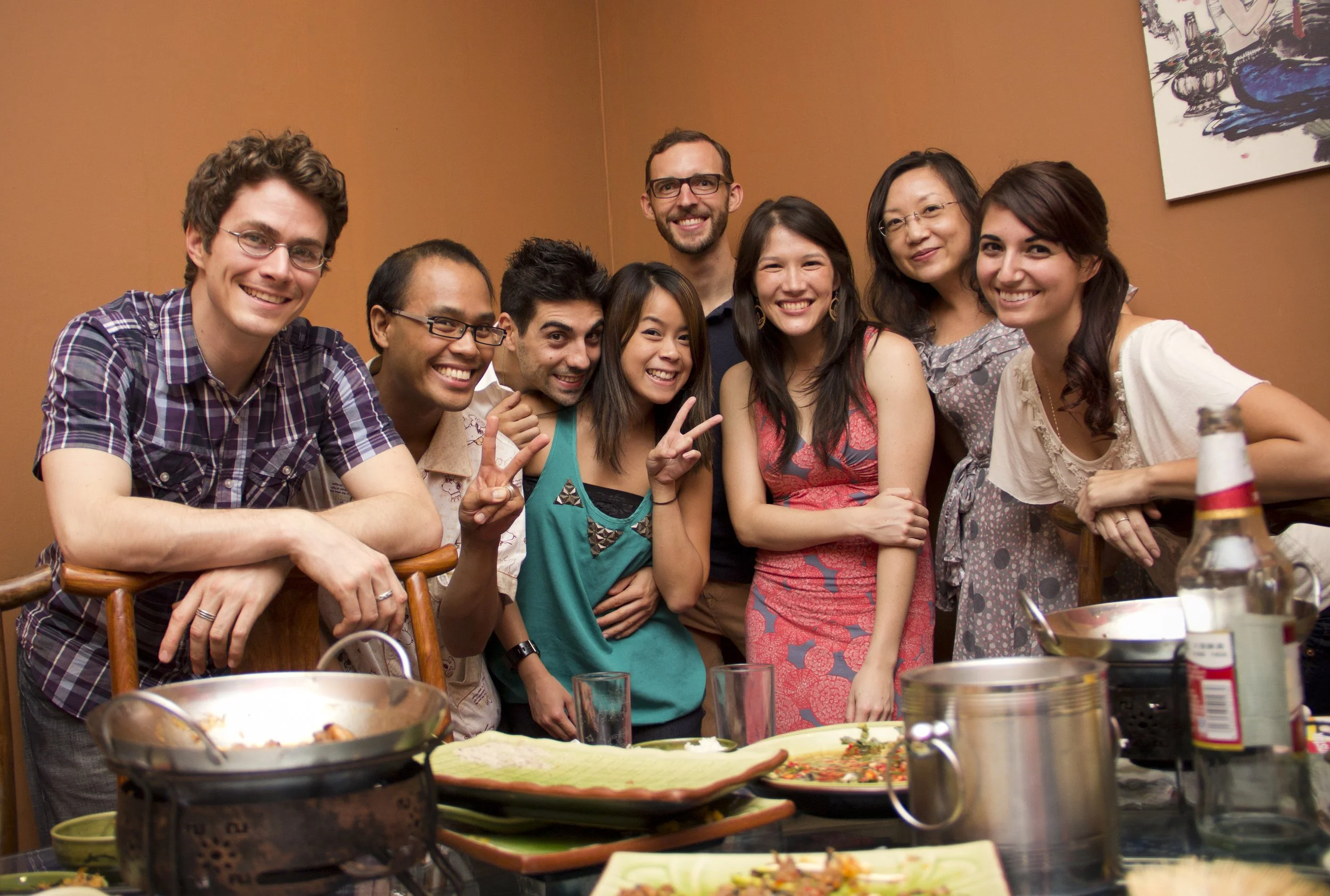Nomad Life: RVing vs Backpacking
So you want to be a nomad. Or maybe you’re already a nomad but interested in trying out a different transient lifestyle. There are lots of different ways to live a nomad life these days, from workcamping to sailing, but if you’re trying to decide how you want to travel full-time, it can be hard to decide which style will suit you best.
Two of the most popular full-time travel styles for Americans are international backpacking (traveling from country to country, staying in short-term accommodations or rentals à la digital nomads) or RVing (in a wide variety of vehicles) across North America.
From my own personal experiences of backpacking over many years and full-time RVing in the U.S for over two years, both offer unique experiences and cater to different preferences. Let's break it down: the perks and quirks of each option!
Adventure
Overlanding/vandwelling/RVing can be done all over the world, but RVers have more of a culture in North America, plus west of the Mississippi River, there is a ton of public land for camping that is suited for RVing like nowhere else in the world. So if your interest is in nature and wide open spaces with no one else around, RVing is an incredible way to live within a completely unique landscape.
Incredible views out your living room windows are a perk of RVing
Having a vehicle means you are free to roam down empty backroads and towns off the beaten path. You also can access a lot of events (festivals, sports, etc) and stay on site with your own home.
Unfortunately, though the United States and Canada have varying cultural spectrums from coast to coast, generally, cities and towns tend to be pretty homogenized, which means you’ll start seeing the same sort of stuff over and over. Even some of the natural attractions can get repetitive, and it would be easy to spend lots of time and gas chasing down similar sights.
Backpacking abroad will put you in more populated hot spots and likely on various tourist routes around each country. Because you’ll be mostly reliant on public transportation, it can be more of a challenge to get off the beaten path but certainly not impossible. You can always rent a car if you need to.
Culturally, you will experience a much wider variety of diversity, heritage, architecture, cuisine, and more. Traveling from country to country means you can seek out the best of the best in the world. You’ll also have more opportunities to expand your mind and experience new ways of life (this is of course, possible as well in North America, but to a less extreme extent).
Even foreign attractions can become routine, though, and it’s easy for all the castles, cities, beachside clubs, and world-class scenery to blend together if you’re traveling too fast for too long. That’s why regardless of whether you’re RVing or backpacking, it’s important to slow down and make sure you’re doing things besides consuming the sights if you want your nomad life to be sustainable.
Mobility
Within the RVing world, there are different levels of mobility. Van dwellers tend to move spots frequently and have more camping options, as they are nimbler and stealthier. If you have a 4x4 truck and overland trailer (or you don’t mind roughing up your normal trailer), you can access more wilderness spots. If you have a trailer, fifth wheel, bus, or other large rig, you can chill in one place and basically have a studio apartment setup.
While towing or in a larger motorhome, getting from one place to the next may feel like a bit of an ordeal, especially if you’re new to RVing. You can’t spontaneously stop unless there is room enough for your rig. Gas station stops have to be planned in advance, and finding a spot in the wilderness often involves scouting ahead to see where you can fit.
Towing or driving a big rig isn’t necessarily hard, but it means you have to be a lot more attentive while you drive, and that is draining. Between low gas mileage, towing anxiety, and longer travel times, an RV can sometimes feel like a big weight in your nomad life.
However, the freedom to get in your vehicle, with your home, and just go is fantastic. The U.S is a car-centric country and especially in the West, you’ll be taking full advantage of our massive roads and extensive highway systems, not to mention our adorable kitschy road trip culture.
If you value mobility and flexibility, I highly recommend boondocking as your main mode of camping. Especially in recent years, RVing has become much more popular, and to reserve choice campgrounds, sometimes you have to book up to a year in advance (or become a cancellation ninja and watch state park reservations like a hawk).
During our first year of RVing, I was overwhelmed by just how much I had to plan in advance, leaving us with a rigid schedule for the entire year. Once we got into boondocking, I relished the complete freedom to just show up at a patch of desert and have our only consideration be the 2-week stay limit for public land.
In most of the rest of the world, public transportation has been elevated to an art, letting backpackers cover a surprising amount of ground. Even in developing countries, buses put all of America’s public buses to shame. Once you leave North America, flights are drastically less expensive, especially if you focus your travel to one sector at a time (ie fly within SouthEast Asia or Europe).
Traveling with only a backpack is the ultimate in mobility and simplicity. You can be completely spontaneous and change your plans based on recommendations from locals or fellow travelers. You can arrive in a new town without reservations and follow new friends on a whim.
Potentially though, if you’re into slower or budget travel, you might want to rent a place for at least a few months at a time, which keeps you a little less mobile. It’s also worth looking at places far in advance, depending on how long you want to stay in an area and what’s happening there during that time.
Budget
You can spend as much or as little money as you want on RVing or backpacking lifestyles. On the cheap end, there’s boondocking (camping for free on public land) and hostel-hopping versus resort campgrounds and fancy hotels for luxury travelers.
In my opinion, though, international backpacking can be made into a more budget option than RVing.
Cars: so useful and so expensive!
Firstly, without a car, you can cut out a huge chunk of monthly spending on gas, maintenance, taxes, and insurance. Even while paying no rent while boondocking, vehicle costs dramatically increase your overall cost of living. Our average annual cost for our truck and trailer is about $9,000 (and we don’t have any car payments or a two-vehicle setup that many with a motorhome and a tow vehicle have). Although cheaper than a house, you’ll always have some kind of maintenance costs in an RV, as well as some utilities if you’re buying propane or paying for electricity, water, dumping, etc.
Secondly, as of 2023, the United States is one of the most expensive countries to live in (on par with Scandinavian countries and vacation destinations such as Monaco). While this ranking is skewed by cities like San Francisco and New York, and there is a reasonable cost of living to be found in Midwest, Southern, and rural areas, the general cost of staples like groceries or going out on the town is higher than even in most of Western Europe and all expenses are certainly higher than in developing nations around the globe. Adding expensive American health care further increases the cost of living.
I recently spent a month in the United Kingdom, one of the more expensive countries in Europe. I had lived in Edinburgh, Scotland in 2009 on about $400 a month (with school accommodations paid for) and pinched pennies to afford most things, especially with a 2:1 exchange rate in favor of the pound. Returning to the UK in 2023, I was ready for the same financial shock. Instead, my shock was one of delight as I discovered a world of ₤4 pints, ₤10 entrees, ₤50 nice hotel rooms, and cheap groceries (and a much lower exchange rate). While inflation is being experienced all over the world, corporations in the U.S. have taken advantage post-pandemic and continue to price gouge American consumers beyond reason.
If you’re not boondocking, RVing can quickly become just as or more expensive than living in a sticks and bricks home, as campground fees range from $30- $100/night (state parks vs full hook ups in desirable locations). Your best bet for budget living at campgrounds is to find privately owned campgrounds that have a reasonable monthly rate and stay still for a little longer.
Staying for free in Vienna while petsitting this cutie
And of course, backpacking has its own range of nightly costs, depending on your ability to slum it up. My own personal budget record is staying in a private Cambodian hotel room for $5 (with a friend, for $2.50 each). To be clear, it wasn’t a nice room. But you can get free accommodations other ways, like housitting or WOOFing, or couchsurfing. In backpacking, you’ll have so many different options and can also travel during off-seasons to save more money. RVing in an off-season in the US means RVing in the snow (or extreme heat) and that is really for a special breed of stoic people (not me).
However, in backpacking, you’ll always need to search for some kind of roof over your head and while RVing, there is a certain comfort that if you can’t find a place to camp, you can always find some kind of parking spot (at a Walmart, rest stop, or many other overnight options) and enjoy your own roof and bed for free.
Ultimately, the beautiful thing about both RVing and backpacking is that if you can control your monthly costs day by day. Whereas in a house, your rent, mortgage, and utilities are set, with both these nomadic lifestyles, you have control over what you spend, depending on where you go. Need to tighten your belt for a little while? Boondock in the desert for a couple months, or bus to a cheaper country.
And with both RVing and backpacking, the answer to trimming your expenses is to slow down. Spending less on gas and flights and getting better deals with longer-term stays will help you keep a budget and give you more time to enjoy where you are and bring things besides travel and logistics into your nomad life.
Nomad Community
RVers and international backpackers both must be intentional and outgoing to make friends on the road. You don’t need to be a gregarious extrovert, but if you’re willing to join adventures, strike up conversations, and be open-minded, news friends will find their way to you.
Depending on your age, you may struggle at first making friends among other RVers. It’s safe to say that the majority of RVers are retirees, and many RV activities and campgrounds can be geared toward that demographic (so good news if you’re a retiree!). But working-age RVers are a growing group, and if you know where to look, you can find your tribe of like-minded nomads. Your best bet is festival-like nomadic gatherings, especially ones geared towards skoolies or van dwellers, as that tends to be a younger subset (and most don’t mind if you show up in whatever rig you have). We’ve met RVing friends through an Xscapers convergence, the Rubber Tramp Rendezvous, and Skooliepalooza.
On the other end of the spectrum, many backpackers you’ll meet on the road are in their 20s, taking a gap-year type trip, though of course, travelers of all ages can still be found. Hostels provide a perfect opportunity to strike up conversation and meet people, as well as tourist hot spots or unique excursions. Locals might be more challenging to break through to, but once you do, having a friend with a unique cultural perspective is a treasure.
In my experience, there’s a little more gatekeeping and competition in backpacker circles. I’ve met many backpackers who don’t consider themselves tourists and will decide your worth based on how far off the beaten path you’re willing to go. In contrast, RVers will fall over themselves in their willingness to help you back into a site, fix a technical issue, or even just say hello. There is an eagerness to help each other and share knowledge.
My theory for this difference is that it’s pretty easy to throw on a backpack and get a plane ticket, whereas getting into the full-time RV lifestyle takes a lot of work, investment, and mistakes. It’s a higher bar for entry, and once past it, people want to expand their nomad community. But there are still so many friendly, adventurous backpackers who will enhance your journey tenfold.
Wonderful, life-long friends can be made in both RVing and backpacking. Whether you’re all heading to southern Arizona for the winter or following the Thailand tourist trail, it can be surprisingly easy to run into the same people again and again. Being a nomad comes with its own struggles, and having a community that understands your lifestyle is one of the most important things to seek out on the road.
Comfort
When you’re towing or driving your home on wheels, like a turtle with a shell, you have many of your creature comforts with you. After hundreds of strange beds (and even a few bed bugs) around the world, traveling with my own bed feels like the height of luxury.
I only live in 26 feet of space, but it’s one of my favorite homes I’ve ever have. For me, RVing combines the newness and excitement of regular travel with my own little space that I own for a much lower cost than a ‘real’ home. When we have full hookups, the comfort level feels no different from a small apartment (except no shared walls!).
All our earthly possessions for living abroad (our dog is in the brown bag)
While backpacking, you obviously have a much lighter load with you, which is a plus for freedom and mobility, but means you are at the mercy of whatever accommodation you’re staying at for kitchenware, bedding, etc. You have fewer clothes and little room for hobby materials. However, if you’re a minimalist, it might be actually be added comfort to have so few belongings to worry about.
If you’re boondocking in an RV, you will definitely be giving up some normal comforts. You’ll need to limit water usage, learn to empty your own waste tanks, and your solar electricity will depend on the weather. Compared to even a mediocre hostel with running water, trash service and effortless utilities, the off-grid RV life can be a lot harder. But with boondocking comes the comforts of privacy, peace, and quiet.
Whatever trade-off you decide to make with your nomad life in terms of comfort, if you value time, experiences, and an ever-curious approach to life, know that the sacrifices will be well worth it.
Is RVing or Backpacking Right for You?
Ultimately, your decision to either RV or backpack full-time comes down to what you’re looking to get out of nomad life. Even though Mr. Dirtbag Daoist and I are very frugal people, by RVing in the US, we are not currently choosing the most budget lifestyle (even with primarily boondocking). But we get other benefits like our nomad community here, being able to visit sticks and bricks friends and family, certain festivals we can roll up to, and incredibly open, quiet spaces (we’ve become sticklers about noise and light pollution).
We do plan to spend more time abroad in the near future for a lower cost of living and other benefits of non-American culture. But another beauty about RVing and backpacking is that they can be combined! If you leave to go backpacking and still have a homebase, while you’re traveling, you’re paying for that home to be kept up. Nothing hurts budget travel like having two rents at the same time. You could potentially lease out your home, but that comes with its own responsibilities and attachment. With RVing, you can store your entire home for as low from $40-$150 a month, depending on location, and get the best of both worlds as you spend half the year living in cosmopolitan locations across the globe and the other half nestled in beautiful wilderness.
And finally, though I don’t have experience with it personally, plenty of people RV around the world! Unless you buy a rig, you’ll have to get used to small, expensive rentals, but with a plethora of unique and even free campsites, Europe, New Zealand, Australia and many other places can offer an excellent mashup of these two lifestyles.

